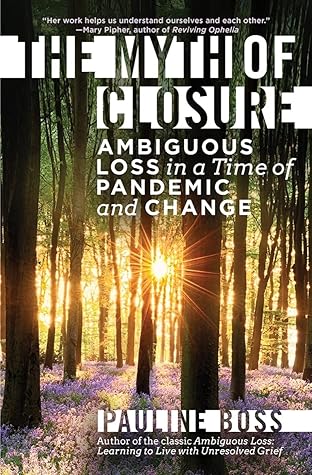More on this book
Kindle Notes & Highlights
by
Pauline Boss
Started reading
March 10, 2022
My point is this: Continuing to use the term “closure” perpetuates the myth that losses and grief have a prescribed time for ending—or never starting—and that it’s emotionally healthier to close the door on suffering than to face it and learn to live with it.
physical
“ghosting”
psychological.
Death ends a life, not a relationship.
In relation to loss, closure means termination, finality, something finished. It implies a clear and absolute ending. However, many people don’t want such total, absolute termination of a relationship.
The benefits of not seeking closure are many: First, it allows us to savor or resist the parts of ourselves that others have influenced, positively or negatively; second, giving up on closure increases our tolerance for ambiguity and thus makes us more resilient for future experiences of loss; third, without needing closure, we can feel more rooted in this world because we now see more than just ourselves in it. We are genetically part of those who have gone before us—and thus part of the human species. With continuity instead of closure, we are not alone.
To acknowledge the trauma from the terrible losses caused by slavery, we must first look back to understand the problem, and only then can we look forward to new changes and systemic solutions.
we must see resilience as a way we adapt to trouble or scarcity—and not as the systemic solution.
What we all have in common at such times is that none of us wants to be dominated by an outside force. But the virus became just that—a dominating force
As we try to make sense of the time of pandemic, thinking both/and will continue to help us. It was both a terrible time and a time of growth; it was both a time of loss and a time of gaining new insight. It was both a time of current loss and a time of reckoning for past and present losses for people of color. For me, it was both a time of painful personal loss, the death of my husband, and a time of new learning about larger-scale losses.
Trying to master his grief would not work. Grief is meant to be expressed and lived with, not controlled.


